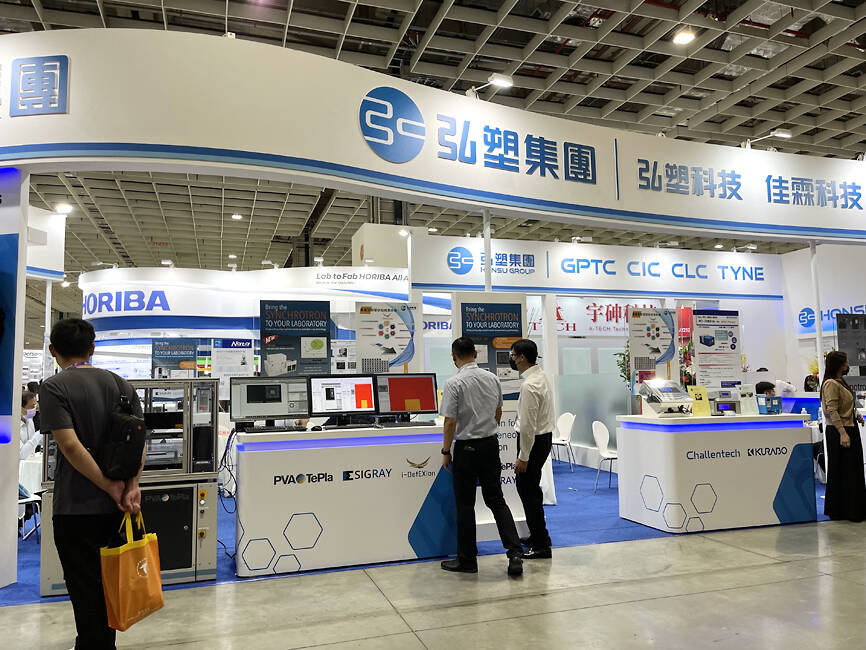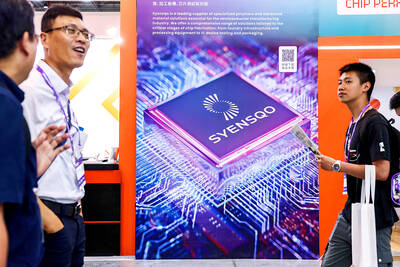Grand Process Technology Corp (GPTC, 弘塑科技), a supplier of advanced chip packaging equipment, yesterday said that order visibility would continue to improve through the first two quarters of next year, driven by strong customer demand fueled by the artificial intelligence (AI) boom.
Lead times for some key equipment are increasing, meaning customers might face longer wait times than the usual delivery period of six to nine months, the company said in a statement.
Previously, GPTC reported order visibility extending six months through the end of this year, an improvement over the typical three-month period tracked by most semiconductor companies.

Photo: Grace Hung, Taipei Times
The company’s confidence grew as US tariff policies became clearer, with the 90-day reprieve set to end on Friday, prompting a shift from its previously cautious stance on customer demand due to tariff-related risks.
“Our factories are currently operating at full capacity. Equipment order visibility now extends through the first half of 2026,” the company said. “We are benefiting from robust demand in AI, high-performance computin and advanced smartphone chips, which are driving significant demand for advanced packaging equipment like chip-on-wafer-on-substrate [CoWoS].”
GPTC focuses on supplying a wide range of semiconductor wet processing equipment mainly used in advanced CoWoS packaging technology, including wet benches, wet cleaning systems and single wafer set processing systems.
The company holds about 75 percent of the CoWoS wet process equipment market in Taiwan.
Taiwan Semiconductor Manufacturing Co (台積電), one of GPTC’s largest customers, earlier this month told investors that it is struggling to meet the strong demand for its CoWoS capacity.
GPTC also counts ASE Technology Holding Co, the world’s largest chip testing and packaging service provider, among its major customers.
The company reported a 54 percent year-on-year increase in revenue for the first half of the year to NT$2.9 billion (US$98.2 million). It expressed confidence in achieving another record-high revenue this year, surpassing last year’s record of NT$4.07 billion.

SEMICONDUCTOR SERVICES: A company executive said that Taiwanese firms must think about how to participate in global supply chains and lift their competitiveness Taiwan Semiconductor Manufacturing Co (TSMC, 台積電) yesterday said it expects to launch its first multifunctional service center in Pingtung County in the middle of 2027, in a bid to foster a resilient high-tech facility construction ecosystem. TSMC broached the idea of creating a center two or three years ago when it started building new manufacturing capacity in the US and Japan, the company said. The center, dubbed an “ecosystem park,” would assist local manufacturing facility construction partners to upgrade their capabilities and secure more deals from other global chipmakers such as Intel Corp, Micron Technology Inc and Infineon Technologies AG, TSMC said. It

EXPORT GROWTH: The AI boom has shortened chip cycles to just one year, putting pressure on chipmakers to accelerate development and expand packaging capacity Developing a localized supply chain for advanced packaging equipment is critical for keeping pace with customers’ increasingly shrinking time-to-market cycles for new artificial intelligence (AI) chips, Taiwan Semiconductor Manufacturing Co (TSMC, 台積電) said yesterday. Spurred on by the AI revolution, customers are accelerating product upgrades to nearly every year, compared with the two to three-year development cadence in the past, TSMC vice president of advanced packaging technology and service Jun He (何軍) said at a 3D IC Global Summit organized by SEMI in Taipei. These shortened cycles put heavy pressure on chipmakers, as the entire process — from chip design to mass

Germany is to establish its first-ever national pavilion at Semicon Taiwan, which starts tomorrow in Taipei, as the country looks to raise its profile and deepen semiconductor ties with Taiwan as global chip demand accelerates. Martin Mayer, a semiconductor investment expert at Germany Trade & Invest (GTAI), Germany’s international economic promotion agency, said before leaving for Taiwan that the nation is a crucial partner in developing Germany’s semiconductor ecosystem. Germany’s debut at the international semiconductor exhibition in Taipei aims to “show presence” and signal its commitment to semiconductors, while building trust with Taiwanese companies, government and industry associations, he said. “The best outcome

People walk past advertising for a Syensqo chip at the Semicon Taiwan exhibition in Taipei yesterday.